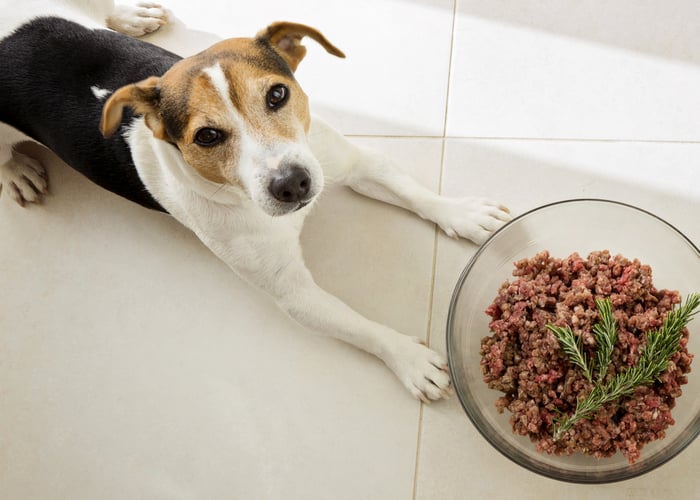Can I Feed My Dog Ground Beef and Rice Every Day?
In recent times, many dog owners have shown interest in exploring alternative diets for their furry companions, including feeding them ground beef and rice every day. While the idea of offering a homemade meal to your dog may seem appealing, it’s crucial to understand the implications and considerations associated with this dietary choice.
The Importance of a Balanced Diet
A balanced diet is the cornerstone of your dog’s health and vitality. Just like humans, dogs require a variety of nutrients to thrive. A well-rounded diet ensures that your canine friend receives the essential vitamins, minerals, proteins, and carbohydrates necessary for optimal growth, energy, and overall well-being.
Diverse Nutritional Needs: Dogs have specific nutritional needs that must be met through their diet. These include proteins for muscle health, fats for energy and coat health, carbohydrates for energy, and a range of vitamins and minerals to support bodily functions.
The Role of Protein: Protein is particularly vital for dogs, as it supports muscle growth, repair, and overall health. However, it’s not just about protein quantity; the quality and variety of protein sources matter.
Complex Carbohydrates: Carbohydrates provide a valuable source of energy for dogs. While rice can serve as a carbohydrate source, it’s essential to choose complex carbohydrates that offer sustained energy release.
Is It Safe to Feed Dogs Ground Beef and Rice Every Day?
Feeding your dog ground beef and rice every day can be a cause for concern, as dogs require a more comprehensive and diverse range of nutrients. While ground beef does offer protein, it’s not a complete protein source by itself, and relying solely on it may lead to nutritional deficiencies over time.
Pros of Ground Beef: Ground beef is a good source of high-quality protein that dogs need for muscle maintenance and repair. It also contains essential amino acids required for various bodily functions.
Potential Nutritional Imbalance: Despite its protein content, ground beef lacks the complete nutritional profile that commercial dog food provides. Essential vitamins, minerals, and other nutrients are often missing from this single-source food.
Rice as a Carbohydrate Source: While rice can provide carbohydrates, it’s essential to remember that dogs require more than just carbohydrates to thrive. A diet solely based on rice and ground beef can result in an inadequate intake of other essential nutrients.
Potential Risks of a Ground Beef and Rice Diet
Feeding your dog ground beef and rice every day can lead to several potential risks and drawbacks due to the lack of nutritional variety. While it might seem like a simple and convenient option, it’s crucial to be aware of the potential downsides.
Nutritional Deficiencies
One of the primary concerns with a ground beef and rice diet is the risk of nutritional deficiencies. Dogs require a wide spectrum of vitamins, minerals, and other nutrients to support their immune system, organ function, and overall health. Relying solely on ground beef and rice can lead to imbalances that could impact your dog’s long-term well-being.
Lack of Essential Vitamins and Minerals: Ground beef and rice do not offer the full range of vitamins and minerals that dogs need. Deficiencies in essential nutrients like calcium, vitamin D, and certain B vitamins can arise, affecting bone health, energy levels, and more.
Omega-3 Fatty Acids: Omega-3 fatty acids, commonly found in fish and certain oils, are crucial for skin health, coat quality, and inflammation regulation. This vital nutrient is often lacking in a ground beef and rice diet.

Excess Protein
While protein is essential for dogs, an excess of it can also have negative effects. Ground beef is a dense protein source, and consistently feeding it to your dog may result in excessive protein intake. This can potentially strain the kidneys and lead to health issues over time.
Kidney Strain: High protein intake can put additional stress on your dog’s kidneys as they work to process and eliminate the excess nitrogen from protein breakdown.
Potential for Weight Gain: Excess protein can contribute to weight gain if not balanced with other nutrients. Overweight dogs are at risk of various health problems.
Digestive Upsets
Introducing sudden dietary changes, such as switching to a ground beef and rice diet, can lead to digestive upsets for some dogs. Dogs have sensitive digestive systems that require gradual transitions between foods to avoid issues like diarrhea, vomiting, and gas.
Gradual Transition: When altering your dog’s diet, it’s essential to make gradual changes over several days to allow their digestive system to adjust.
Sensitive Stomachs: Some dogs may be more prone to digestive upsets than others. It’s important to monitor your dog’s reaction to dietary changes closely.
The Importance of Variety in Your Dog’s Diet
Dogs thrive on dietary variety, just like humans. A balanced and varied diet helps ensure that your dog receives all the necessary nutrients for their overall health and vitality. While ground beef and rice may be offered occasionally, they should not be the sole components of your dog’s diet.
Meeting Unique Nutritional Needs
Different nutrients play specific roles in your dog’s health. For instance:
Proteins: Essential for muscle growth, immune system function, and enzyme production. Carbohydrates: Provide energy for physical activity and brain function. Fats: Support skin and coat health, as well as energy storage. Vitamins and Minerals: Essential for various bodily functions, including bone health, immune support, and more.
Avoiding Boredom and Sensitivities
A varied diet not only meets your dog’s nutritional needs but also helps prevent dietary boredom and sensitivities. Just like humans, dogs can become tired of eating the same foods every day, leading to a lack of appetite.
Behavioral Enrichment: Offering a variety of foods stimulates your dog’s senses and provides mental stimulation, reducing the likelihood of behavioral problems.
Allergies and Sensitivities: Feeding the same ingredients daily increases the risk of developing allergies or sensitivities to those specific ingredients.
The Importance of a Complete and Balanced Diet
A complete and balanced diet is vital for your dog’s health and well-being. While ground beef and rice may offer certain nutrients, they cannot provide the comprehensive range of essential elements that commercial dog food does. Here’s why opting for commercial dog food formulated by experts is often a safer choice:
Expert Formulation
Commercial dog food is meticulously formulated to meet the specific nutritional needs of dogs. Reputable brands collaborate with veterinary nutritionists to ensure that their products contain the right balance of proteins, fats, carbohydrates, vitamins, and minerals.
AAFCO Standards: Dog food that meets the Association of American Feed Control Officials (AAFCO) standards undergoes rigorous testing to ensure it provides complete and balanced nutrition.
Tailored to Life Stages: Commercial dog food often comes in formulations designed for different life stages, from puppies to seniors, ensuring that each phase’s unique requirements are met.
Consider Homemade Diets Carefully
While homemade diets can be appealing, they require careful planning and consideration. Creating a nutritionally balanced homemade diet that meets your dog’s needs is a complex task that should ideally involve consultation with a veterinarian or veterinary nutritionist.
Avoid Nutritional Gaps: Homemade diets must be carefully balanced to avoid nutritional gaps. This involves sourcing a variety of high-quality ingredients to cover all nutrient requirements.
Consultation is Key: If you’re determined to feed homemade meals, consult a veterinarian to formulate a diet plan that considers your dog’s individual needs, potential sensitivities, and health conditions.
Signs Your Dog Isn’t Thriving on Their Diet
Understanding your dog’s response to their diet is crucial for their well-being. Here are some signs to watch for that might indicate your dog isn’t thriving on a ground beef and rice diet:
Weight Changes
Unintended weight gain or loss can be an indication that your dog’s diet is imbalanced. Weight management is vital for overall health, and sudden changes can point to nutritional issues.
Underweight: An inadequate intake of essential nutrients can result in weight loss and lethargy. Overweight: An overly rich diet lacking proper nutrients can lead to weight gain and related health problems.
Coat and Skin Conditions
Your dog’s coat and skin condition are often reflective of their diet’s quality. A dull coat, excessive shedding, or skin problems might indicate nutritional deficiencies.
Dry Skin: Inadequate intake of omega-3 fatty acids can lead to dry, flaky skin. Dull Coat: A lack of essential nutrients like biotin can result in a lackluster coat.
Energy Levels and Behavior
A dog’s energy levels and behavior are strongly tied to their diet. Nutrient deficiencies can affect their energy, mood, and overall behavior.
Lack of Energy: An imbalanced diet might leave your dog feeling lethargic and less enthusiastic. Behavioral Changes: Nutritional imbalances can even manifest as changes in behavior, including irritability and restlessness.
Consultation with a Veterinarian: Expert Tips for Feeding Dogs
When it comes to your dog’s diet, consulting a veterinarian is an essential step to ensure their health and well-being. Here are expert tips to consider:
Individualized Dietary Recommendations
A veterinarian can provide personalized dietary recommendations based on your dog’s age, breed, size, activity level, and any underlying health conditions. This guidance ensures that your dog’s unique needs are met through their diet.
Tailored Nutritional Plan: A veterinarian can create a customized dietary plan that addresses any specific health concerns your dog may have.
Addressing Allergies and Sensitivities: If your dog has food allergies or sensitivities, a vet can help identify safe and nutritious alternatives.
Commercial Dog Food
Reputable commercial dog food offers convenience and peace of mind, knowing that your dog is receiving a well-balanced diet. Look for products that meet AAFCO standards and are appropriate for your dog’s life stage.
Reading Labels: Learn to read and understand dog food labels to make informed choices about the nutritional content of the product.
Transitioning Gradually: When introducing commercial dog food, transition gradually to prevent digestive upsets.
Homemade Diets with Veterinary Guidance
If you’re considering preparing homemade meals for your dog, consult a veterinarian or veterinary nutritionist for proper guidance. Homemade diets require careful planning to ensure they provide adequate nutrition.
Recipe Analysis: A veterinarian can analyze homemade diet recipes to identify any nutritional gaps and suggest adjustments.
Avoiding Common Pitfalls: Consulting a professional helps you avoid common pitfalls in homemade diets, such as nutrient imbalances.
Prioritizing Your Dog’s Health
Feeding your dog a balanced and nutritious diet is a fundamental aspect of responsible pet ownership. While the idea of feeding ground beef and rice every day may seem appealing, it’s essential to prioritize your dog’s long-term health and well-being.
By working closely with a veterinarian, exploring reputable commercial dog food options, and considering homemade diets with professional guidance, you can make informed dietary decisions that ensure your dog receives the nutrients they need to thrive.
Remember, your dog’s health is paramount. Providing a diet that meets their nutritional requirements contributes to their happiness, vitality, and overall quality of life.
FAQs About Feeding Dogs Ground Beef and Rice Every Day
1. Is it safe to feed my dog ground beef and rice daily?
- Feeding your dog ground beef and rice every day may lack essential nutrients. Consult a vet for a balanced diet plan.
2. Can I give my dog only ground beef for protein?
- Relying solely on ground beef can lead to nutritional imbalances. Dogs need diverse protein sources for complete nutrition.
3. Should I cook the ground beef before feeding it to my dog?
- Yes, cooking ground beef is essential to eliminate potential pathogens that could harm your dog’s health.
4. Can dogs digest rice easily?
- Rice can be a digestible carbohydrate source for dogs. However, a diet solely based on rice may lack other nutrients.
5. How often can I feed my dog ground beef and rice?
- Ground beef and rice can be occasional treats, but not a complete diet. Consult a vet for a balanced feeding plan.
6. Are there any risks of feeding ground beef to dogs?
- While ground beef offers protein, excessive intake can lead to imbalances. Ensure a well-rounded diet with veterinary guidance.
7. Can I mix vegetables with ground beef and rice?
- Including vegetables can enhance nutritional value. However, a diet’s balance should be overseen by a veterinarian.
8. What are the consequences of nutrient deficiencies?
- Nutrient deficiencies can lead to health issues like weakened immunity, poor coat quality, and digestive problems.
9. Can I supplement ground beef and rice with vitamins?
- Supplements should be administered under veterinary guidance. A balanced diet usually negates the need for additional supplements.
10. Is ground beef a good source of essential fatty acids?
- Ground beef might contain some essential fatty acids, but not in sufficient quantities. Consult a vet for complete nutritional sources.
11. Can ground beef and rice cause allergies in dogs?
- A limited diet can increase the risk of allergies. Introducing variety is often recommended to avoid sensitivities.
12. What signs indicate that my dog needs a more balanced diet?
- Weight changes, coat and skin issues, and changes in behavior can signal an imbalanced diet that needs adjustment.
13. Can I switch my dog’s diet abruptly?
- Abrupt diet changes can upset your dog’s stomach. Gradual transitions are recommended to prevent digestive issues.
14. How can I tell if my dog’s diet is working for them?
- Monitor weight, coat condition, energy levels, and overall behavior. Consulting a vet can provide insight.
15. Can homemade diets provide complete nutrition?
- Homemade diets can, but they require careful planning and expert consultation to avoid nutritional gaps.
16. Can ground beef and rice be part of a balanced diet?
- They can be components of a balanced diet but should not be the sole sources. Consult a vet for well-rounded nutrition.
17. Can puppies be fed ground beef and rice?
- Puppies have higher nutritional needs. Consult a vet for proper puppy diet recommendations.
18. Can senior dogs eat ground beef and rice?
- Senior dogs also require specific nutrition. Consult a vet to ensure their dietary needs are met.
19. Can ground beef and rice affect my dog’s energy levels?
- An imbalanced diet can lead to energy fluctuations. Proper nutrition contributes to consistent energy levels.
20. How can I transition my dog from ground beef and rice to balanced food?
- Gradually introduce commercial balanced food while decreasing ground beef and rice portions to avoid digestive upset.




